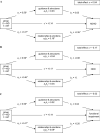Process Mechanisms in Behavioral Versus Nondirective Guided Self-help for Parents of Children with Externalizing Behavior
- PMID: 36064990
- PMCID: PMC9444695
- DOI: 10.1007/s10578-022-01400-0
Process Mechanisms in Behavioral Versus Nondirective Guided Self-help for Parents of Children with Externalizing Behavior
Abstract
The study examined potential mediating effects of therapist behaviors in the per-protocol sample (n = 108) of a randomized controlled trial comparing a behavioral and a nondirective guided self-help intervention for parents of children with externalizing disorders (4-11 years). Additionally, from an exploratory perspective, we analyzed a sequential model with parental adherence as second mediator following therapist behavior. Outcomes were child symptom severity of attention-deficit/hyperactivity disorder (ADHD) and oppositional defiant disorder rated by blinded clinicians, and parent-rated child functional impairment. We found a significant indirect effect on the reduction of ADHD and functional impairment through emotion- and relationship-focused therapist behavior in the nondirective intervention. Additionally, we found limited support for an extended sequential mediation effect through therapist behavior and parental adherence in the models for these outcomes. The study proposes potential mediating mechanisms unique to the nondirective intervention and complements previous findings on mediator processes in favor of the behavioral group. Trial registration ClinicalTrials.gov NCT01350986.
Keywords: Adherence; Externalizing behavior; Mediation; Parent training; Self-help; Therapist behavior.
© 2022. The Author(s).
Conflict of interest statement
MD receives royalties from publishing companies as author of books and treatment manuals on child behavioral therapy and of assessment manuals published by Beltz, Elsevier, Enke, Guilford, Hogrefe, Huber, Kohlhammer, Schattauer, Springer, Wiley. He receives income as consultant for Child Behavior Therapy at the National Association of Statutory Health Insurance Physicians. He also receives consulting income and research support from Lilly, Medice, Takeda, and eyelevel GmbH. CD, JK and KS receive royalties from a publishing company as authors of a self-help book on child behavioral therapy. All authors are certified in cognitive behavioral therapy and / or are affiliated with an institution involved in the training of cognitive behavioral therapy.
Figures


References
-
- Weisz JR, Kuppens S, Ng MY, Eckshtain D, Ugueto AM, Vaughn-Coaxum R, et al. What five decades of research tells us about the effects of youth psychological therapy: a multilevel meta-analysis and implications for science and practice. Am J Psychol. 2017;72:79–117. doi: 10.1037/a0040360. - DOI - PubMed
-
- Reardon T, Harvey K, Baranowska M, O’Brien D, Smith L, Creswell C. What do parents perceive are the barriers and facilitators to accessing psychological treatment for mental health problems in children and adolescents? A systematic review of qualitative and quantitative studies. Eur Child Adolesc Psychiatry. 2017;26:623–647. doi: 10.1007/s00787-016-0930-6. - DOI - PMC - PubMed
Publication types
MeSH terms
Associated data
Grants and funding
LinkOut - more resources
Full Text Sources
Medical

